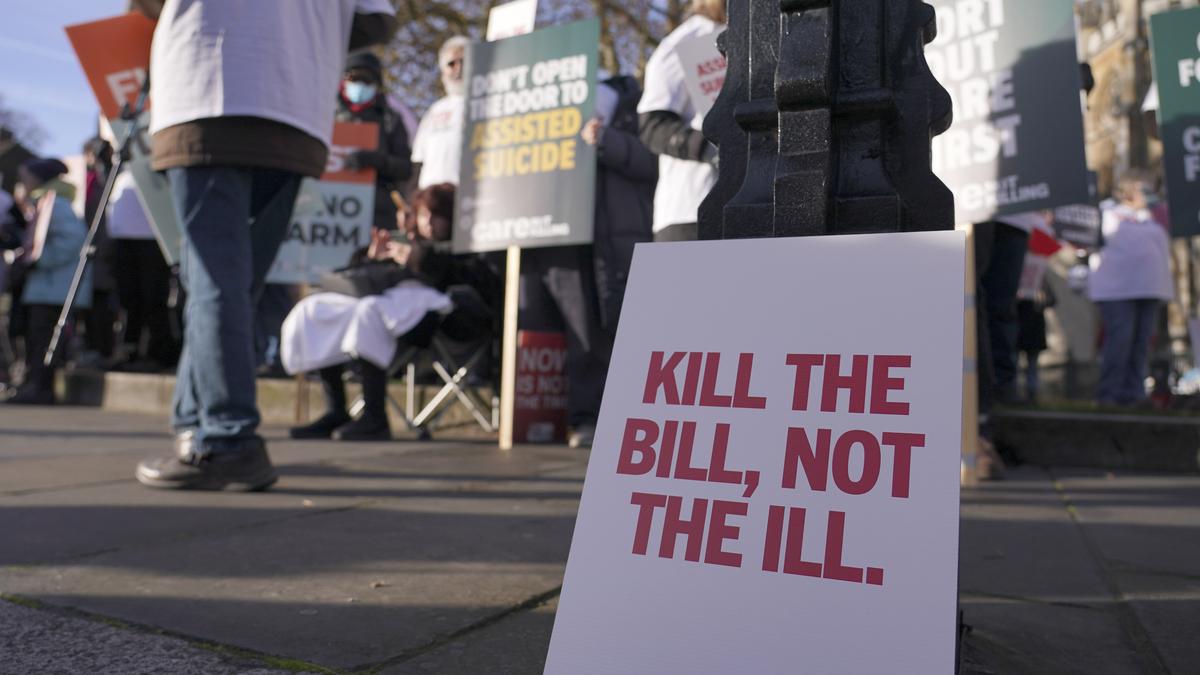The story so far:
Britain’s House of Commons on November 29 voted by a majority to legalise assisted dying — a less controversial synonym for assisted suicide in England and Wales. The step signals a seismic social shift on an emotive issue. Advocates regard the new Bill as a humane and compassionate intervention that should — for those who want to exercise the option — bring closure to a painful, debilitating and degrading dependence on the immediate family. Opponents, who include the head of the Church of England, are apprehensive that the severely disabled and vulnerable patients may feel forced to end their lives to relieve the burden on relatives. “It should never become easier to seek help to die than to live,” they say. The debate on the Bill’s merits has also brought to the fore concerns that the delivery of hospice and palliative care services could be undermined. Portrayed sometimes as a “Give us our last rights” campaign, about 75% of the public has backed the liberalisation of assisted dying, as per a U.K. National Centre for Social Research survey.
How controversial is the move?
The U.K. courts have time and again maintained that given the sensitive ethical, philosophical, and social questions involved, the subject of assisted dying was not a matter on which the judiciary could pronounce a decision based on concrete evidence. Successive British governments have similarly maintained that any change to existing law was for parliament to consider and a matter of their conscience for individual MPs and that the government would officially adopt a neutral stance. The Terminally Ill Adults (end of life) legislation was thus brought forward as a private member Bill by the Labour MP Kim Leadbeater. Among its supporters were Prime Minister Keir Starmer, the Home Secretary, the chancellor of the exchequer, and the Opposition leader Rishi Sunak. Six Cabinet Ministers opposed the proposal.
What is the current law in this area?
Suicide, (self-inflicted death), or attempted suicide are not in themselves criminal offences in England and Wales. Conversely, an act that encourages or assists a person to commit suicide or attempted suicide is a criminal offence that carries a 14-year prison sentence under the 1961 Assistive Suicide Act.
What is the proposed law?
The Bill before parliament seeks to give terminally ill, mentally competent adults who have less than six months to live — which assumes that a reliable method exists of forecasting survival — the option to end their life. Under one stipulation, any such request must be authorised by two doctors and a High Court judge.
What were the petitioners’ prayers?
Since 2001, severely disabled applicants have petitioned the U.K. courts that the 1961 law, as well as the prosecution’s refusal to allow them to end their lives under medical assistance, was incompatible with their rights under the European Convention on Human Rights (ECHR). At issue was the right to life (Article 2), which the petitioners viewed as entailing the right to self-determination and an entitlement to end life with assistance. They have also argued that the denial of the option to die with assistance — insofar as it failed to alleviate suffering — amounted to cruel and degrading treatment prescribed under Article 3. It moreover constituted an infringement of the right to privacy and freedom of conscience enshrined in Articles 8 and 9. Finally, as persons with disabilities who needed assistance to end their lives, the denial of permission by the prosecution amounted to discrimination, in breach of Article 14 of the ECHR.
What did the court rule?
The U.K. House of Lords in 2002 unanimously overruled these contentions. But, in a 2014 Supreme Court decision, the majority opined that although the 1961 law was incompatible with the rights of two incurably suffering but not terminally ill petitioners, it was for parliament to modify the law. In 2015, the European Court of Human Rights ruled that the U.K. Supreme Court was under no obligation to examine the merits of a challenge to primary legislation and that Britain’s government was open to concluding that this was a matter for parliament to arrive at a suitable determination. It is thus crystal clear that only new legislation can alter the status quo in this matter.
What is the status outside?
The crown dependencies of Jersey and the Isle of Man are close to enacting legislation to allow assisted dying for the terminally ill in the next two years. Scotland, where a separate bill is under the active consideration of political parties, is deliberating whether the subject matter falls within the realm of competence of Holyrood, the Scottish devolved parliament.
Following Switzerland, the first country which in 1942 legalised assisted dying, unless driven by selfish motives, societies seem to see wisdom on compassionate grounds to allow people to end their lives. The 1997 Death with Dignity Act in the state of Oregon, which allows mentally sound adults with terminal illness and six months to live, to end their lives through self-administered drugs, has broadly set the tone for legislation within the U.S., most of Australia and New Zealand. Canada’s 2016 Medical Assistance in Dying law may be availed even by those whose condition is not terminal, if it is grievous or irremediable. The relevant 2002 law in the Netherlands grants immunity from punishment for doctors for euthanasia under strict conditions. Belgium’s 2002 act also includes psychiatric illnesses and since 2014 has been extended to minors with parental consent. Spain and Germany have enacted laws but are at various stages of enforcement. Legislation is still pending in France and Ireland.
What is the position in India?
In Common Cause vs. Union of India (2018), the Supreme Court affirmed that the “right to die with dignity” is integral to the right to life and personal liberty under Article 21 of the Constitution. The court also legalised “passive euthanasia,” which involves the withdrawal of life support from terminally ill patients or those in a permanent vegetative state. This allows individuals to die a natural death in the absence of medical interventions. The top court also issued comprehensive guidelines to facilitate passive euthanasia. For instance, if a patient leaves behind a living will, it must be executed in the presence of two witnesses and attested by a Judicial Magistrate. In 2019, the Indian Society of Critical Care Medicine filed an application seeking modification of these guidelines, arguing that they were onerous and impractical. Accordingly, a five-judge Constitution Bench in 2023 simplified the process by imposing strict timelines at each stage and limiting the role of the Judicial Magistrate. In September, the Health Ministry released draft guidelines on withdrawing medical support for terminally ill patients, addressing a regulatory gap that had left healthcare professionals in the lurch. These specify that doctors must refrain from initiating life-support measures when they offer no benefit to the patient and are likely to cause suffering and a loss of dignity.
Garimella Subramaniam is Director, Strategic Initiatives, AgnoShin Technologies Pvt. Ltd
Published – December 26, 2024 10:46 pm IST





